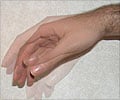Increased helmet use in alpine sports like skiing and snowboarding may fail to reduce risk of traumatic brain injury particularly concussion. Non-helmet-wearing participants were more likely to sustain injuries than helmet-wearing participants.

In France, a growing awareness of head injuries and improvements in the comfort and weight of helmets have resulted in a significant increase in child helmet use to 97 percent in 2014 and an increase in adult helmet use from nine percent in 2005 to 59 percent in 2014.
Investigators assessed the effect of helmet use in 30 French ski resorts between 2012 and 2014. Interviews were also conducted on the slopes with people without injuries. Two sets of cases (1,425 participants with TBI and 1,386 with OTHI) were compared with two sets of controls (2,145 participants without injury and 40,288 with an injury to another part of the body).
Using participants without injury as control, investigators found that helmet wearers were less likely to sustain any head injury. Using participants with an injury to another part of the body as control, the risk of OTHI was lower among helmet wearers. However, no significant reduction was found in the risk of TBI.
These case control studies led to several key findings:
- Non-helmet-wearing participants were more likely to sustain injuries (TBI, OTHI, and injuries to other body parts) than helmet-wearing participants.
- When involved in a traumatic event, non-helmet-wearing participants had a greater risk of sustaining OTHI. However, the effect of helmet use on the risk of TBI (and concussion) was not significant.
- Participants with low skill levels, those aged less than 16 and over 50 years, and snowboarders, were at higher risk of head injury. Collisions and accidents in a snow park were more likely to induce head injury than other traumatic incidents.
Source-Eurekalert














